Maor Albeck (Amitei Bronfman ‘06): Agunot Prevention Document
Mavoi Satum is the leading organization in Israel fighting against get abuse and in support of agunot. (A get is a document that must be signed by a husband for divorce. Agunot are Jewish women who are separated from their husbands but are unable to obtain a legal Jewish divorce.) The current war brings with it the danger of Agunot if a husband is missing but there is no explicit confirmation of his death. This project, led by Maor, seeks to prevent such a situation by having spouses sign a document prior to military service that will circumvent the problem. Maor will conduct a campaign to share the document among the relevant audience. The campaign will be conducted in cooperation between Mavoi Satum and other organizations working to solve the Aginut problem.
Learn more at https://haheskem.org.il/shtar/.
Roni Anaki (Amitei Bronfman ‘13): A website for The Lab for Cultural Preservation.
The goal of The Lab for Cultural Preservation NGO, founded by Roni, is to serve as a center for knowledge of the preservation of material culture in Israel. The organization will offer preservation consultation to archives, libraries, museums and the general public. The AVF grant will go towards building a website for the organization to make its services and knowledge accessible and to reach as many institutions and people as possible who need help in preserving their cultural assets.
Update: Check out their website at https://www.theconservationlab.org/.
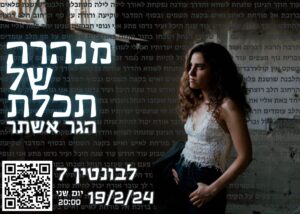 Hagar Ashtar (Amitei Bronfman ‘15): A Blue Tunnel
Hagar Ashtar (Amitei Bronfman ‘15): A Blue Tunnel
A Blue Tunnel is an evening of songs and stories created by Hagar Ashtar, which seeks to glorify the treasures of Hebrew poetry. The main emphasis of the show is exposing new audiences to this unique world of classic Hebrew poetry. The AVF grant is aimed at a marketing campaign on social media that will attract a young audience that is not yet connected to the genre. (See image on left.)
Omri Biton (Amitei Bronfman ‘14): Personal Magic – for Gaza Envelope Children
This project seeks to help children from the Gaza Envelope. A series of magic workshops will help the children build up their self-confidence, communication skills, personal resilience, and sense of success. The series will be led by Omri Biton, an experienced magician and educator, and will encourage the children to put on a final show for the community.
Abby Fisher ‘18: Leave if No Response
The play Leave if No Response, based on Abby’s own experiences, deals with coming of age with two identities, Jewish and queer, and seeks to present a wide spectrum of dynamic identity combinations. A production of the play will be held this summer in NYC. The AVF grant aims to promote the play and strengthen its creative community.
Yonatan Harari (Amitei Bronfman ‘13): Knew Blue – Tromblau & Friends
The Knew Blue album is a musical project composed of original tunes echoing Jewish nigunim and philosophical traditions. The album was created by various musicians in Israel and the U.S., whose collaboration have established a unique framework for musical discourse for people from diverse backgrounds.
Shiri Klayman (Amitei Bronfman ‘17): “I Will Always Be: A Home for IDF Paramedics”
This project seeks to support the military paramedics community by offering psychological assistance, commemorating those who died in the line of service, and leading communal gatherings. The project is led by Shiri, a paramedic herself, and her friends who serve as military paramedics. The grant will be used to create a website for the project.
Alma Klemes (Amitei Bronfman ‘16): “My Piece is Tied in a Thread: Between Home and War”
Alma’s final project in Visual Communication Studies at the Bezalel Art Academy, Alma collected and designed a book that includes diverse expressions of the feelings and experiences she and many other women had and continue to have since the outbreak of the war. The book is based on eight conversations with different women, and interweaves testimonies, images, and other texts. Alma’s work will be presented at Bezalel’s graduate exhibition this August in Jerusalem.
Update – See her book here.
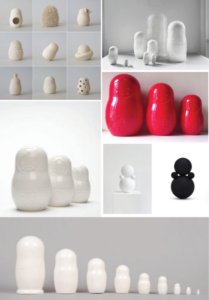 Poli Sharonov (Amitei Bronfman ‘03): Ceramic Matryoshkas
Poli Sharonov (Amitei Bronfman ‘03): Ceramic Matryoshkas
Poli is an artist and designer. In this project, she will design and create matryoshkas (wooden nesting dolls) made of china and porcelain. By using these materials, instead of the wood from which they are usually made, she seeks to express the fragile status of women, mothers, and wives in the reality of crisis and war. (See image on right.)
Kyra Siegel ‘20: “The Middle Distance” Film on Diaspora and Care
Kyra will direct, shoot, and edit a documentary film that will express the different ways in which three characters relate to Israel, Diaspora, identity, and memory. The three characters are Kyra; Alma, an Israeli opera singer who lives in Berlin; and Nina, Alma’s 7-year-old daughter.
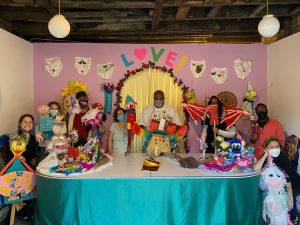 Priscilla Frank ‘06 is working with six artists for “That Paradise Place,” an experimental, collaborative puppet musical about the love, sex, and fantasy lives of artists with disabilities. Every song in the show is adapted from a firsthand account of an erotic experience or reverie shared by an artist who identifies as having a disability. Writer and director Priscilla Frank will help each artist to crystallize their unique testimonial and conceptualize a puppet alter ego to tell their story. These puppet alter egos provide artists a layer of protection and anonymity when sharing intimate stories, perhaps for the first time. Love, sex, and creativity are largely absent from conversations about justice and rights for people with disabilities. The omission reflects our society’s fear of sexuality outside capitalist patriarchal norms, and the deeply ingrained prejudice many hold toward people with disabilities. We reject the assumption that eroticism, pleasure, and play are superfluous characteristics of a flourishing human life. The show’s joyous celebration of making love in its many forms will inspire audience members to embrace pleasure as a human right. Viewers with disabilities will be represented in their fullness as people with complex desires and inner lives.
Priscilla Frank ‘06 is working with six artists for “That Paradise Place,” an experimental, collaborative puppet musical about the love, sex, and fantasy lives of artists with disabilities. Every song in the show is adapted from a firsthand account of an erotic experience or reverie shared by an artist who identifies as having a disability. Writer and director Priscilla Frank will help each artist to crystallize their unique testimonial and conceptualize a puppet alter ego to tell their story. These puppet alter egos provide artists a layer of protection and anonymity when sharing intimate stories, perhaps for the first time. Love, sex, and creativity are largely absent from conversations about justice and rights for people with disabilities. The omission reflects our society’s fear of sexuality outside capitalist patriarchal norms, and the deeply ingrained prejudice many hold toward people with disabilities. We reject the assumption that eroticism, pleasure, and play are superfluous characteristics of a flourishing human life. The show’s joyous celebration of making love in its many forms will inspire audience members to embrace pleasure as a human right. Viewers with disabilities will be represented in their fullness as people with complex desires and inner lives.
Intercollegiate Community: Shalshelet Shivyoni. The project is the launch of Shalshelet Shivyoni, an intercollegiate community centered around halacha and inclusion. We oversee the planning and execution of the community-building activities, including Shabbatonim, learning opportunities, and prayer spaces, and facilitate communication and collaboration between the participating colleges and universities. Our goal is to create a sustainable network that provides opportunities for students to explore and engage with traditional Jewish practice in a welcoming and egalitarian environment.
Leah Jordan ‘03: Azara: Opening the Beit Midrash is a growing new cross-communal learning initiative that aims to create a culture of Torah learning in the UK across denominations. Azara aims to open the beit midrash to everyone, with classes, programs and events. Our Flagship Program — The Azara Summer Program (Edinburgh, 21st June – 23rd July 2023) is the first ever month-long cross-communal yeshiva program in the UK. It’s an unprecedented chance for our participants to immerse in Jewish texts, deepen their relationship with Judaism, and learn how to shape their own tradition. We welcome people of all backgrounds, genders, and levels of experience to join us in a month-long exploration of Talmud and other Jewish texts. Together, we’ll create a community of learners where no question is too difficult to ask or answer. Through world-class teaching, participants can build the skills to engage with Torah on their own terms.
Itai Kooper (Amitei Bronfman ‘17) aims to publish Kushta Demilta: A Collection of Essays that will focus on the long neglected teachings of Sephardic Rabbis and leaders in the Yeshiva community. One year ago, Itai established an online journal called Kushta Demilta that centers the Torah of Sephardic Rabbis. He wants to take this online journal one step ahead, and publish a collection of essays by Rabbis and leaders in the Yeshiva community, who focus on Sephardic teachings. The teachings of Sephardic Rabbis have been neglected for generations. They bring a different spirit to Torah studies – a more welcoming and balanced one, which is also more attuned with everyday life. This spirit is being left out of the Yeshivas and Batei Midrash. Itai wishes to make a change and to help fix this injustice, and with his hope to connect the Yeshiva study to the spirit of Sephardic teachings. Through this publication, Itai is hoping to expand the roots of the Sephardic teachings in the world of Yeshivas, amplify the presence of the teachings of Sephardic Rabbis, and hopefully bring a spirit of patience and acceptance to the Yeshiva discourse.
Roei Shalom (Amitei Bronfman ‘14): The children’s book “Queen Exactly and King Almost“ will demonstrate the importance of these two opposing qualities we all possess. Roei writes, “I started writing the story as a writing exercise and a challenge. A little girl shared with her father a story she had been told in Sukkut. I heard only half of the story, but I was intrigued by her description of ‘Queen Exactly’ and felt drawn to write about it. The idea became a reality… I see the world as divided into two big forces. As a teacher, I see the strength of these forces in the children’s world. Growing up we all learned we should prefer one force. Precision is a strong suit – being precise in time and creation is something we all value. We were all taught to draw within the lines, and when we were late – we were punished for that. But there is an opposite force within us, and this is the force that drives us towards creation. It is the spontaneous, unleashed, power of being ‘almost.’ People who act from their gut feeling have a passion for what they do. I wrote this book to give place for this underrated force and give it more place and meaning in our lives. The purpose of this book is to help parents and children see the value in ‘almost.’ I want this book to influence parents to value the ‘almost’ of their children, and I want to help children understand the importance of maintaining balance using precision or the force of ‘exactly’.”
Michal Shendar (Amitei Bronfman ‘16) is designing a summer class for students in Israel with no legal status, to help them catch up with the skills of their Israeli peers before they start middle school. This intensive summer class is for seventh grade students with no legal status that are about to enter school where they will study alongside Israeli students. The class will prepare them for the transition, academically and emotionally. These children were born and raised in Israel, yet so far they were receiving their education in schools that are exclusively for children of asylum seekers and labor migrants. Our goal is to help them catch up on the skills that Israeli children their age already have, and they lack because these were not taught in the schools they attended. Alongside the academic work, the students will take part in discussions about self image, racism, identity and belonging, in order to prepare them mentally for the encounter with their Israeli peers. We will also hold meetings with the student’s parents, in order to prepare them for the challenges of sending their child to Israeli middle school and explain the structure of the educational system in Israel.
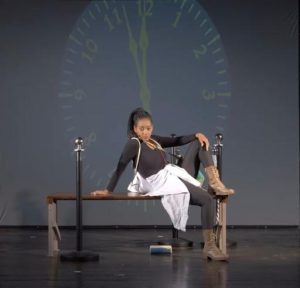 Aviva Nagosa Terri (Amitei Bronfman ‘02) will create a PR platform for her solo play Made in Israel, which focuses on the identity conflict of an Ethiopian teenage girl in Israel. The AVF grant will fund a website for the solo play, Made in Israel, written and performed by Aviva. The play centers an identity conflict of an Ethiopian teenage girl in Israel. This play, Made in Israel, is about the journey of an Ethiopian girl in Israel who is going through a process of shaping her identity, while coming upon many obstacles that make it hard for her to find her place in society. She is sharing that as a Black, Jewish, Israeli woman she feels like there is no place where she fits. The story of this one young woman represents the struggle of the whole Ethiopian community in Israel. The play is funny and honest, and is a good fit for young audiences, and also for workers in organizations that deal with politics and identity. This project is meant to create a platform where the information about the play is accessible and represents it well.
Aviva Nagosa Terri (Amitei Bronfman ‘02) will create a PR platform for her solo play Made in Israel, which focuses on the identity conflict of an Ethiopian teenage girl in Israel. The AVF grant will fund a website for the solo play, Made in Israel, written and performed by Aviva. The play centers an identity conflict of an Ethiopian teenage girl in Israel. This play, Made in Israel, is about the journey of an Ethiopian girl in Israel who is going through a process of shaping her identity, while coming upon many obstacles that make it hard for her to find her place in society. She is sharing that as a Black, Jewish, Israeli woman she feels like there is no place where she fits. The story of this one young woman represents the struggle of the whole Ethiopian community in Israel. The play is funny and honest, and is a good fit for young audiences, and also for workers in organizations that deal with politics and identity. This project is meant to create a platform where the information about the play is accessible and represents it well.
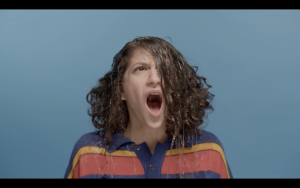 Marnina Wirtschafter ‘15: Doom Scroll is a musical web-series about a cynically Jewish 20-something who finds herself magically trapped in the Torah. Marnina is the creator, writer, and lead actor. Marnina’s partner Michael is a co-writer, composer, and director. In this series, a cynically Jewish 20-something finds herself magically trapped in the Torah. With the help of Biblical characters, her rabbi sister, and original songs, she must make meaning of the ancient text to escape the scroll and return to her life. Episode one, the pilot episode, explores the story of creation. The character, Shira, who is trapped in the Torah, meets God and must grapple with and question the “It was good” nature of the earth’s creation and learn to experience the text critically. The part they’re filming right now is the music video and song that takes us through the creation of the universe in seven days. Then, Shira learns how much Torah she has left before she can escape. This project has also been funded by the Maimonides Fund Jewish Writers Initiative Digital Storytellers Lab.
Marnina Wirtschafter ‘15: Doom Scroll is a musical web-series about a cynically Jewish 20-something who finds herself magically trapped in the Torah. Marnina is the creator, writer, and lead actor. Marnina’s partner Michael is a co-writer, composer, and director. In this series, a cynically Jewish 20-something finds herself magically trapped in the Torah. With the help of Biblical characters, her rabbi sister, and original songs, she must make meaning of the ancient text to escape the scroll and return to her life. Episode one, the pilot episode, explores the story of creation. The character, Shira, who is trapped in the Torah, meets God and must grapple with and question the “It was good” nature of the earth’s creation and learn to experience the text critically. The part they’re filming right now is the music video and song that takes us through the creation of the universe in seven days. Then, Shira learns how much Torah she has left before she can escape. This project has also been funded by the Maimonides Fund Jewish Writers Initiative Digital Storytellers Lab.
Neta Aricha (Amitei Bronfman ’16): “Sick Bed” – debut film
Neta’s first short film, which was written as part of her studies, seeks to give voice and expression to feelings and times of transition and collapse, and to bring women together through the observation of one woman in her bed, experiencing her disintegration and construction, her pain, dreams, hopes, alienation and reacquaintance with her body. The film was written and directed by Neta, and was made by a team of 14 strong and dedicated women.
Sara Bamberger (’97): Soul Stories: How We Heal
Based on the author’s experience as a holistic healer in Jerusalem, “Soul Stories: How We Heal” is a collection of lyrical narratives about how the subconscious can direct the body, mind and soul to realign and bring even the most dis-eased person back into balance. The work integrates reflections on Jewish approaches to physical and emotional healing, as well as how the Israeli healthcare system tries to best meet the needs of its citizens, many of whom carry traumatic memories from wars, military operations, terrorist attacks and the Shoah. Each patient’s story offers a startling, intriguing and sometimes humorous example of how life experiences manifest in our physical and emotional bodies.
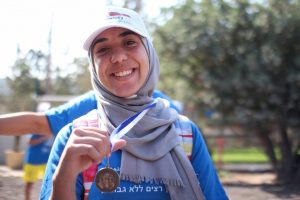 Shoshanna Ben-David (Amitei Bronfman ’14): Runners Without Borders (picture on left)
Shoshanna Ben-David (Amitei Bronfman ’14): Runners Without Borders (picture on left)
Runners Without Borders was founded in November 2014 by Jerusalem-based athletes in response to the wave of violence that swept Jerusalem, and offers platforms for Jews and Arabs to meet, interact and collaborate through running. Today, more boys (Jews and Arabs) come to the race than girls, and Shoshana’s goal is to change the situation by creating a nucleus of Arab women from East Jerusalem and Jewish women from West Jerusalem who will participate in the race.
Katherine (Katje) Bulthuis (’21): Froyen Lider – Yiddish Songs
“Froyen Lider” (Women Songs) is a collection of poems by Yiddish writer Kadya Molodowsky that Katje is setting to music. The poems handle subjects such as tradition, gender, and Jewish identity. Katje hopes to produce these songs as an album or EP, creating art that young Jews today can relate to, as well as helping Yiddish feel more accessible. The project started as Katje’s Beyond Bronfman project.
Dvir Cahana (’11): Perfecting the Art of Torah Study
Dvir is the founder of The Amen Institute, which is creating an art education program for rabbinic schools. The program will bring in Jewish artists from their J.A.W. (Jewish Artists of the Week) Fellowship to show the pedagogic and innovative power of visual midrash, demonstrating the vast possibilities and benefits of democratizing Torah study and empowering people to look at texts in novel ways that they never would have imagined. At the culmination of this year, they will select two of the art pieces that most demonstrated the artists’ unique perspective when probing the text for innovation, poignancy and translating it into their medium of creative expression. The recipients of this distinction will present their works at the Open Orthodox rabbinic seminary, Yeshivat Chovevei Torah. In their presentation they will demonstrate the potency of using art as an exceptional means of engaging with texts and will especially describe the courage to allow one’s own life experiences to inform the way in which a text is read.
Daniel Krane (’12): Ashkenazi Séance – A special theatrical experience (picture on right)
Ashkenazi Séance is Daniel’s New York debut as a director. The play explores what it means to lay down roots as diasporic Jews, looking at Sarah Sanders’ fraught decision about whether to hold on to hold onto a family heirloom, and using it as a larger window into what it means to build community today as an American Jew. It was performed at The Brick Theater in July 2022. (Watch a video about it here.)
Nadav Penn (Amitei Bronfman ’03): “Transitions” exhibition, Mazo Gallery
Mazo Gallery is an independent space for culture and art that was established at the end of 2021 by a collective of six young people from Haifa, including Nadav, with the aim of making art accessible at no cost. The summer exhibition at the gallery, “Transitions,” deals with the question of decomposition and change in nature, the beginning and the end point and the movement in between – a movement that is sometimes linear and sometimes circular. It will feature a young artist, archaeologist, geologist, and a performance artist.
 Talia Rothstein (’12): SUSIKA – A digital art installation (picture on left)
Talia Rothstein (’12): SUSIKA – A digital art installation (picture on left)
SUSIKA is a digital art installation that archives the work of the late Mexican-Jewish artist and Talia’s grandmother, Susana Karchmer, whose artist moniker was Susika. Talia will photograph their grandmother’s sculptures and paintings and display them on a website that will serve as a digital gallery, and plans to take a series of film photographs exploring the relationship between their grandmother’s sculptures and their own body. This creative process of memorialization will explore themes of intergenerational trauma, gender, and the physical experience of loss. It will also tell the story of a Mexican-Jewish experience that is relatively unknown in the United States, thereby adding to our understanding of the richness of Jewish life in the diaspora.
Tom Shai (Amitei Bronfman ‘99): TLGREEN – Green is for everybody
In collaboration with his students at the school where he teaches, Tom leads a multidisciplinary workshop in the field of urban eco-agriculture. The workshop will specialize in the construction and accessibility of gardens for the elderly and those with disabilities, will be based on the activities of at-risk boys, and will operate as a social business. The business will include a carpentry workshop that produces upholstered furniture from recycled wood, a planning and construction team for balconies and yards, and a nursery for propagating and growing plants.
Avital (Eitan) Yafin (Amitei Bronfman ’99): “Emotion research” – A therapeutic app
Eitan will develop “Emotion research,” a therapeutic tool that relies on the basic approach that the patient has the ability to find well-being independently, and that the patient’s own leadership and activity can lead to significant emotional healing. The tool centers around a structured set of questions that deal with different emotions, interviewing people, and talking about the results of the interviews and coming up with significant insights with a therapist. In its initial version, the tool was developed by Eitan’s sister-in-law, the late Hagit Sofer, a communication clinician who did not have time to complete this unique therapeutic approach.
Elisabeth Cohen (’01) – “A Depolarizing Artistic Collaboration Between Middle School Students in Red and Blue America”
16 middle-school students from NYC and 16 from Kentucky will participate in a cross-cultural encounter through the lens of artistic collaboration. They will introduce themselves and their communities, then complete projects that express their identities, values, and aspirations — including areas of agreement, complementarity, and conflict.
Update: The Depolarizing Artistic Collaboration (currently entitled Mirrors) has been hard at work adapting to changing conditions on the ground. The original partnership with an Eastern Kentucky art teacher fell through because the many challenges her community has faced over the past six months left her without the capacity to undertake our project. We have subsequently initiated a second partnership with the Cowan Community Center, an organization in the same town; we look forward to starting a reboot at the beginning of March. The new, shortened version of Mirrors will start with an intercultural exchange through improvisational storytelling, in a format (called the Story Circle) that is comfortable and familiar to our new East Kentucky partners. After the story exchange, students from both KY and NY will have the option to initiate a project (artistic or action-focused) of their own design with our support.
Priscilla Frank (’06) – “All is Full of Love”
“All is Full of Love” is an experimental, collaborative puppet musical about the love, sex, and fantasy lives of people with disabilities, created by and for people with disabilities. The show’s joyous celebration of making love in its many forms will inspire audience members to embrace pleasure as a human right.
Update: The AVF Grant had a major impact on the success of All is Full of Love! It allowed us to pay stipends to the many artists who contributed their time and work to the project. It also allowed us to print playbills that contained the lyrics of every song in the show, allowing viewers to read along with every song. We received feedback that viewers were thrilled to have this document to more clearly understand the emotional and unorthodox lyrics. We also . . . purchased supplies and set pieces… I believe deeply in the relationship between love, spirituality, and sexuality, and felt lucky to be supported by a Jewish organization on a project about sex.
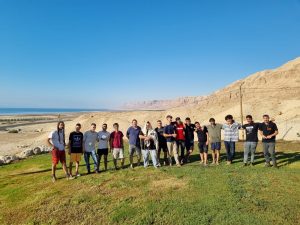 Ariel Gino (Amitei Bronfman ‘01) – Alumni Community of Ma’ale Erev
Ariel Gino (Amitei Bronfman ‘01) – Alumni Community of Ma’ale Erev
“There are now hundreds of Ma’ale High School alumni who are fulfilling the potential of the skills and tools they learned here.”
Ariel Gino assessed the needs of the alumni community of Ma’ale High School, a unique educational establishment for at-risk youth, where he works as an educational director. To meet those needs, Ariel will create a pilot series of group sessions with content related to different inflection points in the lives of alumni. (Picture on left.)
Update: Ma’ale Erev is a unique high school that works with teens who dropped out of the educational system. Establishing an alumni community is a new and exciting step for the school’s students. This process requires that we, the educators, will be involved in the lives of our students even after they graduate.
The AVF grant allowed us to build a network through which we communicate with our alumni. We have already sent out two newsletters with updates on some of the community member’s life events. In addition, we started group therapy for some of our female alumni. The sessions will be led by a professional therapist, and we already have some women who signed up for the first meeting. So far it seems like it will be a great success, and a huge benefit for our community.

From “One Little Goat” – Illustration by Theo Ellsworth.
Dara Horn (’94) – “One Little Goat”
One Little Goat is a graphic novel for readers 8-12 about a Passover seder where no one can find the afikoman, so the seder can never end. They then discover the thousands of previous seders happening beneath theirs– and they travel down through time to find their way out. (Picture on right.)
Update: I’ve revised the text of One Little Goat based on feedback from readers in the children’s publishing sphere, focusing on making the main character’s relationships with his family more clear and compelling. The illustrator Theo Ellsworth has been able to continue with the project, and he has now turned out drawings for almost the entirety of Chapter 2. It’s becoming really beautiful! With the revised script and the significantly larger number of sample pages, we’re now ready to take the project to publishers and hopefully find it a home.
Ben Luria (Amitei Bronfman ‘11) – Access to University
“Closing the gaps between social classes means a great deal to me, and this is a first attempt to do something about this issue.”
Information about scholarships for Israelis studying abroad is limited, spread out, and often provided by commercial companies that profit from mediation and consulting. Ben Luria is a Rhodes Scholar who wants to start a website increasing accessibility to information about scholarships, and which shares success stories as well as tips for success. This will help young people from various backgrounds (especially underprivileged backgrounds) in Israel attend the best institutions around the world for their higher education. Ben learned about the Rhodes Scholarship through the Bronfman alumni network, so this project would bring him full circle.
Update: Scholars is a website that is built to help Israelis reach opportunities for higher education abroad in the best academic institutions in the world, and to find the proper financing if needed. The AVF made this project possible, and about two weeks ago we actually launched this website. It contains detailed information about scholarships Israelis can apply to. There are approachable guidelines to CV writing, all sorts of applications, etc. We have built a whole community of current and former Israeli students who study all over the world, and people who are yet to be such scholars.
Within the first two weeks of the website’s existence, and without even having professional PR, we had 700 visitors and 500 active community members. These numbers are astonishing to us. We are hopeful that we are able to help open new perspectives to young scholars. We already have ideas about how to make this project work even better.
Re’em Sadeh (Amitei Bronfman ‘07) – Global Health Care
“Sharing knowledge has great value in medicine and in moving forward with health care.”
Re’em Sadeh is a medical student who specializes in Point of Care Ultrasound, the “future stethoscope,” which was used extensively during the COVID pandemic. With the knowledge he acquired, Re’em will travel to the Kumasi South Hospital in Ghana, where he will train local doctors to use the instrument. His goal is to lay the groundwork for a long-term relationship and collaboration between Israel and Ghana in the medical field, with an Israeli-American team travelling with him in the following years.
Update: Re’em intended to travel to the Kumasi South Hospital in Ghana, where he planned to train local doctors to use the Ultrasound Care of Point tool. His goal is to lay the ground for a long term relationship and collaboration between Israel and Ghana in the medical field, with an Israeli-American team travelling with him in the following years. Due to the COVID-19 pandemic, the project is postponed until travel will be safer.
Erin Scharff (’99) – “Centering the Immigrant Community”
The Phoenix Legal Action Network (PLAN) helps immigrants remain in the United States, and is the only legal services organization in the region that has been devoted to deportation defense. Erin is leading an effort to engage in critical conversations with immigrant community organizations in the Phoenix-metro area, to center PLAN’s legal work on the needs of this community and transition their board composition to reflect this shift.
Update: Thanks to the generous seed funding of the AVF, my non-profit, the Phoenix Legal Action Network (PLAN), has been able to build more meaningful partnerships with two immigrant-led, community organizations in the Phoenix area. One of those organizations is Trans Queer Pueblo, which focuses on the needs of LGBT+ migrants of color. The other is Aliento, a DACA and undocumented, youth-led organization that focuses on addressing the well-being and emotional healing of immigrant youth, as well as their leadership development. PLAN now provides regular mentorship to local immigrant leaders and has partnered with these organizations on events. We worked with Trans Queer Pueblo to put on a COVID-19 vaccine clinic and asylum application clinic, developed an online intake form for future immigration screening clinics with Aliento, and held a community education event with Arizona Jews for Justice on rental assistance for immigrants. We have also developed a community legal needs assessment that will guide our hiring priorities as we build out our legal team. PLAN’s mission is to promote justice in Arizona by advancing the rights of immigrants and their families. We recognize that to do this we must partner with immigrant-led organizations to build community trust and power. We not only want to provide legal services but also democratize legal knowledge, so that we can dismantle the unjust systems that oppress immigrants. Our AVF grant was our first grant specifically supporting this broader mission, and we feel so thankful to have AVF as a partner for us in this transition. Feel free to drop me a line if you ever find yourself in Phoenix, and please let me know if you have questions about PLAN.
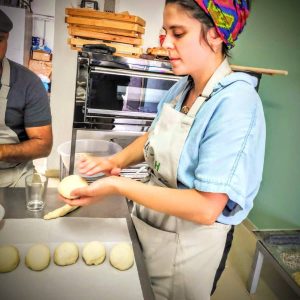 Ariel Pollock Star (’04) – “Lehem Zeh – Collaborative Bread Workshop”
Ariel Pollock Star (’04) – “Lehem Zeh – Collaborative Bread Workshop”
Lehem Zeh is a new social venture that Ariel founded in Yeruham, Israel, where there are large populations of Moroccan, Indian, and Russian Jews, as well as Bedouins, Ashkenazi Orthodox, and more. The aim of this venture is to support local bakers and offer stories, workshops and cultural experiences centered around traditional and unique breads.
Update: Lehem Zeh – Cooperative Bread Workshop has had a very busy fall and winter! We’ve hosted groups from around the country of all sizes and from all backgrounds for workshops on bread and culture, as well as for brunch and conversation. We’ve opened our doors to residents of Yeruham and the greater Negev region (as well as tourists) for pop-up sales of breads and treats made by our partner-bakers. We’ve been featured on TV and in several Hebrew and English media outlets, newspapers and magazines (most recently in “La’Isha,” the nationally circulated women’s magazine affiliated with Yediot). And we are currently planning our next steps and considering paths for growth, both in terms of a bigger space which will allow us to host bigger groups in our workshop kitchen, as well as offering more tools and a bigger facility to our partner-bakers. Come visit us in Yeruham!
Ayelet Wenger (’11) – The Hebrew University Network for Women in Jewish Studies
The Hebrew University Network for Women in Jewish Studies fosters intellectual community and mutual support among women studying ancient Judaism, particularly Talmud, at the Hebrew University. We aim to promote a culture and create forums in which women can connect with, mentor, and encourage other women in the field.
Update: The Hebrew University Network for Women in Jewish Studies … has formed a core and expanding group this semester, organizing lunches with professors as well as less formal meetings amongst themselves. We met with Dr. Avigail Manekin–Bamberger and Prof. Elisheva Baumgarten, who spoke to us about their research and experiences in the academy. Participants also presented their own research to the group, from the first Hebrew play to the relationships between medieval queens and their Jewish subjects. There’s been a great deal of excitement about the project and the conversations that it enables–as one participant wrote to us, “The encounters allowed me to have thoughtful, fascinating and profound conversations with other researchers, women I admired from afar but never got to engage with properly. Meeting them in this sphere has afforded a great deal of inspiration for my own research.” We are excited to build on these connections next semester.
Omer Yavin (Amitei Bronfman ‘07) – Simple Math, an Israeli Hip Hop Opera
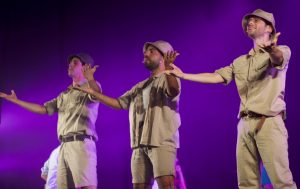 “We aim for a cultural and educational encounter based on Yitzhak Rabin’s assassination and the social issues that have risen from it.”
“We aim for a cultural and educational encounter based on Yitzhak Rabin’s assassination and the social issues that have risen from it.”
Omer Yavin created an original Israeli Hip Hop Opera that explores the life of Itzhak Rabbin and touches on contemporary social issues. The show was created for teenagers and educational institutions as an educational tool to cope with the Prime Minister’s assassination and with social issues of the past, present and future of Israeli society. Now that the show is ready to be staged, Yavin is looking for ways to promote it, and needs funding in order to professionally record some of the original songs from the opera. Listen to the finished recording here.
Update: Simple Math is an Israeli Hip Hop Opera that unfolds the life of Yitzhak Rabin and touches on contemporary social issues of our time. The show was created for teenagers and educational institutions as an educational tool to cope with the Prime Minister’s murder, and with social issues in the past, present and future of the Israeli society. The opera is meant to be an educational tool and its destined crowd are high school teens.
With the help of AVF we were able to record the songs of the play, and upload them to Spotify. The recording went extremely well and the results came out great! The play is still running and many teens all over the country have already seen it.
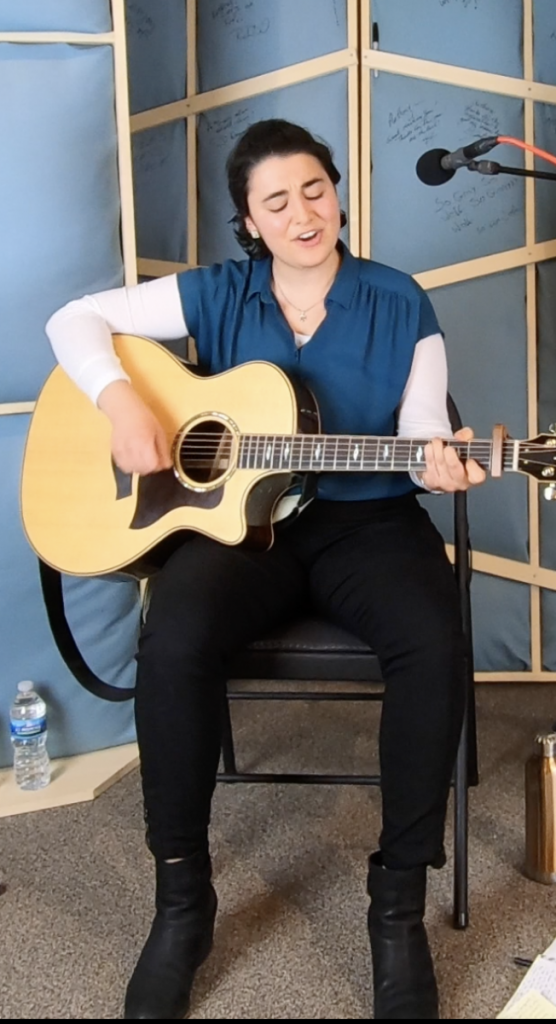
An album of original Jewish music by Syd Bakal.
A new album of Jewish music by Syd Bakal, paired with one or more virtual Jewish singer-songwriter events and possible in-person music performances, circumstances permitting. All profits will go to COVID-19 relief organizations (Crisis Aid International and Black Belt Community Fund). Watch a video of Syd performing Hashkiveinu.
Listen to the finished project here!
#CulturalCreater
A year-long leadership program for seventh-grade students at MS 54 in New York City.
A student leadership program for seventh-graders at the school where Cohen teaches, a highly diverse public school. A diverse group of 30 students will meet weekly to grow social-emotional and leadership skills, process emotions, and undertake projects to help their school community.
#CommunityBuilder
A virtual orchestral performance of “Can’t You Line ‘Em” by W.G. Still, the most prominent African-American composer of the 20th century.
A virtual orchestral performance of “Can’t You Line ‘Em” by W.G. Still, the most prominent African-American composer of the 20th century, to honor the 125th anniversary of Still’s birth. The musicians will be drawn from the roster of the Boston Chamber Symphony (“BCS”), taking special care to select a racially diverse group of musicians for this performance.
See the finished project here!
#CulturalCreater #MoralVoice
A laboratory of virtual Jewish education, with the ultimate end-goal of developing and disseminating effective distance learning strategies for Jewish educators.
A laboratory of virtual Jewish education, where five young, pluralistic, rising Jewish educators will teach 20 experimental courses and workshops. After the 20 session period is finished, Ellenson and the educators will write a joint piece for publication about what they have learned about virtual Jewish learning pedagogies that can be replicated, and to create templates of curricula that they will freely advertise and distribute. They will also offer themselves as consultants-for-hire to institutions adapting their curricula, as well as hold a mini-conference to actively share with the community the best practices they have developed.
#CommunityBuilder
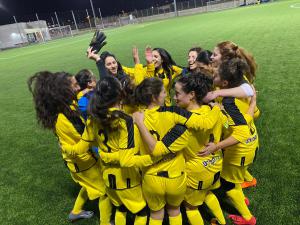
A team-building event for Beitar Jerusalem, the first-ever all-women’s professional soccer team of Jerusalem.
A post-COVID team-building event for Beitar Jerusalem, the first-ever all-women’s professional soccer team of Jerusalem consisting of Arab, Jewish, religious and secular players. This two-day event will feature team-building workshops and bonding time for the team, who have not been able to meet in person since the start of the COVID crisis. This will help ensure the continuity of this young team. Avraham is the founder and manager of Beitar Jerusalem – part of a fledgling professional women’s soccer movement.
#CommunityBuilder
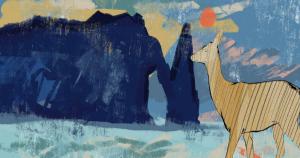
An animated music video to accompany the new song “Ayala”.
An animated music video to accompany Gamlieli’s new song “Ayala,” on his new album “Storage Room” – a new way to reach audiences since COVID-19 is preventing live performances. Animator Hanani Horowitz has already begun work on this project in collaboration with the musician, but additional funding is required to bring it to life. The song and animation aim to spark discussion about a promise of peace and tolerance to nature and of our connection to nature and good, and to inspire optimism and happiness.
#CulturalCreater
A project which redirects unsold produce at Machane Yehuda Shuk into a communal refrigerator which is free to all Jerusalem residents.
Restarting an existing project, the Social Refrigerator of Machane Yehuda Shuk, which provides unsold produce for free to any passerby, thereby redirecting food that would otherwise be thrown into the garbage to feed needy Jerusalemites. The funding would be used to sustain the project and ultimately expand the scale of the project and spread awareness about it.
#CommunityBuilder #MoralVoice
A film told from the perspective of seven-year-old Eli, as she processes the sudden death of her father, and the continued presence of death in life.
Kuban’s final project at Sam Spiegel Film School, which will be an autobiographical film told from the perspective of seven-year-old Eli, as she processes the sudden death of her father, and the continued presence of death in life.
#CulturalCreater
A series of workshops for American and Israeli Bat Mitzvah girls and their parents, focused on identity-building and feminist empowerment.
Digital workshops for Bat Mitzvah girls and their parents, in Israel and America. The content includes workshops on identity, planning for the future, self-expression, learning from inspiring women, and more. The income from these workshops will help sustain Shavot, an organization that works year-round to uplift young women. Ran serves on the board of Shavot and helped to develop the content.
#CommunityBuilder
A seminar for young Israelis at pre-military academies to learn about and implement sustainability and environmental activism.
A seminar for representatives of various pre-military academies (religious, secular, and mixed) to learn how to promote sustainability, environmental awareness, and environmental activism at their respective academies. Post-military volunteers will act as mentors to the group, and will guide them throughout the year to implement what they have learned. This is the newest iteration of a movement founded by Naftali to “grow an Israeli local ecological discourse based on the values of Zionism and Jewish heritage.”
#CommunityBuilder #MoralVoice
In 2019, we held a special grant cycle for Israeli Amitim. Both North American and Israeli alumni participated in reviewing and selecting the grantees.
Maor Albeck (Amitei Bronfman ’06) – Responsible marriage. A campaign that encourages couples, before marriage, to recognize the legal, social, and political implications of their wedding and to choose the nature of their marriage with awareness.
Yahel Halevi (Amitei Bronfman ’17) – Bridges. On May 16, 2019, at the Hartman Institute in Jerusalem, a fascinating and innovative event will take place: “Bridges – In what way?” An event of cultural abundance, it will be presented to an audience through a series of short lectures and an exhibition.
Rotem Kaplinsky (Amitei Bronfman ’02) – MeToo. Creating and distributing a graphic icon that means “Stop – you’re sexually harassing me!”
Rotem Kliger (Amitei Bronfman ’12) – Noa Tanu’a. A survey aimed at finding a consensus around transportation questions on the Sabbath.
Ester Meir Hurwitz (Amitei Bronfman ’02) – Vedibarta: Getting to know the ‘other’ in the class. An app that will be a repository of high school students from different populations in Israel who are meant to meet the ‘other’ to discuss issues of identity, even when there is no possibility of meeting face to face.
Yarden Mendelson (Amitei Bronfman ’03) – The Movement for Public Psychology. A movement to form a coalition of organizations that will lead a national solution to change the face of public psychology in Israel.
Alex Riff (Amitei Bronfman ’03) – Documentary web series – Between Cyprus and Tel Aviv. A glimpse into the absurdity of the “1.5” generation who cannot get married in Israel. How is it possible that, 30 years after immigration, many still have to marry in Cyprus? A project from the Cultural Brigade House.
Assaf Shachar (Amitei Bronfman ’99) – “Beit Reshet” Music Center. Establishing a music center as part of a therapeutic diagnostic framework for at-risk boys and girls. It will provide an opportunity for at-risk youth in Ashdod to create and dream.
Michael Veig (Amitei Bronfman ’09) – Do you want to cross the sea? (a film). The story of Noraldin Musa, a leader in the asylum community in Israel, who is looking for a home in the world. A unique and close look at the journey of separation, the uprooting of the roots that grew in Israel, and their planting in Canada.
Yigal Avrahami (Amitei Bronfman ’00) – Training educators how to deal with LGBT phobia among students and educators. The goal of this project is for the Choshen (Hebrew acronym for Educate and Change) organization to reach more educators and provide them with the necessary tools to deal with LGBT phobia among students and educators in Israel. We will strive to reach at least 100 educators, who through their classroom or groups will be able to distribute content to 3,000 children and adolescents.
Evyatar Bar Lev (Amitei Bronfman ’16) – Program for the Development of Urban Youth Involvement – Jerusalem Group. This project will bring together a diverse group of 10th and 11th-graders (religious and secular; Jews, Muslims, and Christians) who attend the schools in the Ginot Ha’Ir Community Administration in Jerusalem to create positive norms of discussion and learning, and a desire to change reality and bring “the tribes” together.
Maor Elback (Amitei Bronfman ’06) – The use of social media in the fight against divorce refusal and “Agunot”. The goal of this project is to renew the website, operate a Facebook page and Twitter account, set up a blog, and publish a regular newsletter for the Mavoy Satum (“Dead End”) organization, helping women who are refused a divorce and Aginut.
Irit Faingold (Amitei Bronfman ‘06) – Translating the report “It’s No Place for Children” into Tigrinya. The Levinsky Garden Library organization has produced a report that documents the voices of the children of “Neve Shaanan” neighborhood, one of Tel Aviv’s most neglected. The report deals with the children’s perception of traveling to Israel, the neighborhood’s violence and neglect, as well as their ambitions and dreams for the future, and includes quotes from dozens of interviews with children ages 13-17. The next stage requires that we translate the report to the Afroasiatic language of Tigrinya, to ensure that their voices and points of view are heard by their parents and adult neighbors.
Daniel Herman (Amitei Bronfman ‘06) – “0202- Points of View from Jerusalem“ will translate information from Arab, Haredi, and Zionist media outlets in Jerusalem on Facebook, in order to pave the way for an understanding between the different parts of the city. For more info, watch their intro video and visit https://www.0202updates.org/.
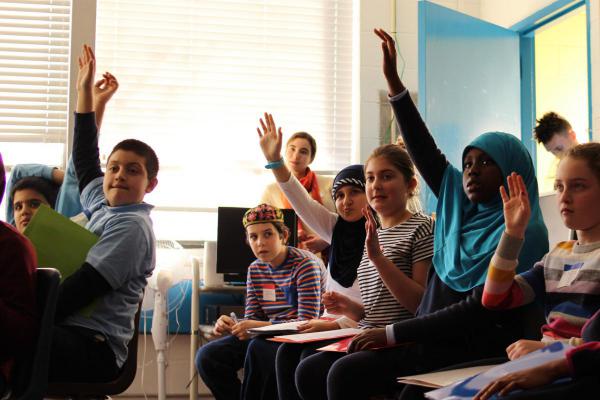
Becki Marcus (’15) Building Relationships: Islam and Judaism (BRIJ) brings together 5th-graders from The Jewish Community Day School and the Islamic School of Rhode Island to Brown University’s campus for dynamic inter-religious learning experience. Crafted in close collaboration with the faculty of the Islamic and Jewish day schools, our interactive curriculum centers on the shared concept of tzedakah in Hebrew and sadaqah in Arabic, both roughly translating to charity. From what we learn in the classroom, we channel our shared religious values into direct action as the students and families of the two schools work together to support local organizations in Rhode Island.
Rena Yehuda Newman (’15) – House of Jacob/People Israel: A Trans & Jewish Zine. Rena Yehuda Newman (they/them) will publish the second edition of “House of Jacob/People Israel,” a personal collection of poems, fragments, drawings, and reflections on the intersection of being both a young Jew and a non-binary, transgender person. Focusing on the beauty and struggle of paradoxical-yet-intertwined identities, “House of Jacob/People Israel” seeks to open up conversations about gender in Jewish spaces and highlight otherness through Jewishness. If you or your organization would like to receive a copy of “House of Jacob/People Israel,” contact Rena Yehuda at rnewman3@wisc.edu.
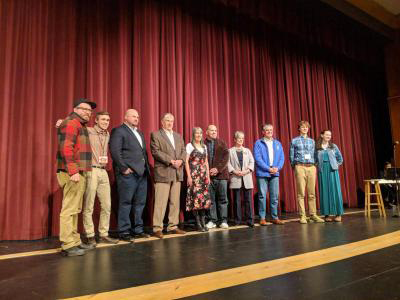
Sammy Potter (’17) The Day of Hope. The first annual Day of Hope featured seven Maine leaders (from the Mayor of Portland to Maine’s most famous musician to Maine’s leader in entrepreneurship) at Yarmouth High School to share stories about hope from their jobs and lives: where they find hope and how they use it to make a positive impact.
Sari Schlesinger Marsha (Amitei Bronfman ‘08) – Renewing the Old. Last year, the project organized four meetings between students of the Reform and Conservative rabbinate and students attending yeshivot, involving more than 200 participants, This year we are expanding the program. We have established a program for students for the rabbinate from the liberal movements to study in depth about core issues of religious Zionism and have more meaningful and in-depth dialogues. The ultimate goal of the project is to break down the barriers within the Jewish people by focusing on a common infrastructure and creating familiarity.
Tom Shai (Amitei Bronfman ‘99) – Urban Community Permaculture Course. This project will create a sustainabilty-focused group of 12-20 environmental activists from at least two different communities in the city of Rehovot, leading to a series of meetings that will develop concrete initiatives to change residential buildings, including the kindergarten and the adjacent synagogue. Thus far we have managed to hold every event with another community (e.g. Ethiopians, ultra-Orthodox, students), and we want all the leaders from the events to form a single group that will speak about what is required for a sustainable life and environment.
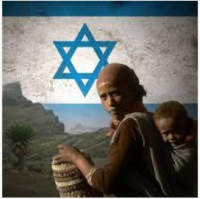
Aviva Simenish (Amitei Bronfman ‘02) You-Her Beauty – a unique journey project. You-Her Beauty is a meeting on the beauty of the culture of the Beta Israel (Ethiopian Jewish) community, from its establishment until today. Participants will experience the culture, cuisine, art, traditional dress, and music of the community. We will hear a living, breathing testimony from my mother, Ruth, beginning with when she left her village in Ethiopia, carrying her baby girl on her back, and continuing with her long journey through the deserts of Sudan, losing all hope until her realization of the “Return to Zion.” I have heard my mother’s story every Shabbat, when she recalls her son whom she lost on the journey. His name was Sanbate – “Shabbat”. One of my goals is to let my mother tell her fascinating story; perhaps it will heal the wounds that have opened in her heart, and in the hearts of so many in this community.
Shira Telushkin (’08) – Within the Eighteen Minutes is a Jewish advice column for anyone navigating a Jewish situation about which they are unsure. For thousands of years, Judaism has been rolling through time and space, picking up everything in its path. That means that, today, we’ve inherited a tradition with a complicated and often confusing mix of rituals, identity markers, red lines, and ways to practice. The peculiarities and particularities of the diverse Jewish world have tripped up many well-meaning Jews and non-Jews, and my proposed project creates a Jewish advice column that can get very different types of Jews having a shared conversations about communal norms, and help decode Judaism for everybody else.
Gabriella Wallk (’17) – TakeOff is a free tutoring app that virtually matches Chicago teens at underfunded high schools with collegiate volunteer tutors. Like an online dating site, students and volunteers input preferences— subject area, level, and availability. Then, students select profiles from TakeOff’s generated matches and contact tutors via in-app texting and video chatting, with split screen capabilities for displaying work. TakeOff’s tutor community includes Chicago-based university and high school volunteers interested in a service learning opportunity. The app includes a breadth of school subjects and mentoring for career interests, extracurricular opportunities, and the college process. By employing technology, TakeOff bridges the gap in human tutoring capital across the “two Chicagos,” addressing educational inequity and expanding quality educational resources.
Abraham Waserstein (’16) – Princeton University Intercollegiate Moot Beit Din Competition and Shabbaton. The incredible aspect of Moot Beit Din is that it illustrates to students the applicability of ancient Jewish laws and teachings in dealing with present-day issues. By offering a shabbaton style experience, a collegiate Moot Beit Din would offer students within the entire spectrum of religiosity and Jewish knowledge the possibility to meaningfully interact with Judaism in a way that can be applicable in their everyday lives. The competitive style of Moot Beit Din as well as its structure as a weekend event where Jewish students have an opportunity to meet each other is a spectacular way to foster a future generation of Jewish people who are engaged with and excited about the Jewish heritage.
Karen Zasloff (’91) – “Right of Admission Reserved” is a shadow puppet performance about post-apartheid South Africa through the eyes of an American visitor. My project goal is to reflect through experimentation with the art form of puppetry, the complexities of people trying to overcome social barriers — walls that keep them in and keep them out — to form a dynamic community. In working in a metaphorical dreamlike way, and suggesting through the manipulation of puppets, the role of external, entrenched controls in society, I am asking how art can transform thought. (Click here to see clips from a work-in-progress performance at Cape Town.)
Yair Agmon (’04) – Pnei Zaken: In the Presence of the Aged – a Web Documentary. A documentary web series dedicated to exploring different aspects of the thing we find so scary to deal with: old age.
Zohar Atkins (’05) – Torah as Poetry, Poetry as Torah. Talented, eclectic writers gather in NYC to write and read poems on classical themes from Jewish tradition.
Eli Batalion (’97) – Trust – A Short Film. Can you really trust your “trusted” financial advisor? This short film explores themes inspired by the Madoff Ponzi scheme.
Avlana Eisenberg (’93) – The Musicians of Bremen. Banished from the barnyard for being different, a ragtag group of animals form their own family in this magical musical family tale scored by a chamber orchestra.
Michael Grumer (’04) – “Lone Parents” – A national support network for parents of individuals who have moved to Israel to serve as lone soldiers in the Israel Defense Forces.
Nadia Kalman (’92) – Russian Jewish Literature: Online Resources for Teaching and Learning. Contemporary Russian Jewish Literature: border-crossing resources for the classroom and beyond.
Alex Maged (’11) – What’s Pshat? What’s Pshat? is a blog dedicated to sharing original literary and interdisciplinary readings of the Torah Parshah with 1300+ weekly subscribers.
Sari Schlezinger Marsha (’08) – Renewing the Old. Renewing the Old is a project aimed at transforming the field of encounter between rabbinical students at national-religious Yeshivot in Israel and liberal North American seminaries.
Leah Mundell (’90) – Migrant Lives and Leadership. The “Migrant Lives and Leadership” photo exhibition provokes community discussion about our connection to migrants locally and globally.
Alex Riff (’03) – Israeli Novy God. “Israeli Novy God” is a nationwide project meant to introduce the Soviet‐Israeli holiday to the wider public, thus making it an inseparable part of Israeli culture.
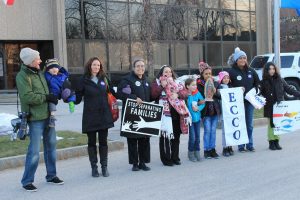
In the photo above, Rabbi Margie Klein Ronkin and ECCO leaders hold non-violent direct action to protect immigrant families.
Margie Klein Ronkin (’96) – Race Training: Building Beloved Community. Training that builds relationships and understanding across race, class, and faith amongst leaders working together on criminal justice reform.
Hannah Sarvasy (’99) – Preempting the tidal wave: The Nungon Community Technology Centre. Introduce tech to New Guinea rainforest hamlets in the local language to promote language sustainability in the digital age.
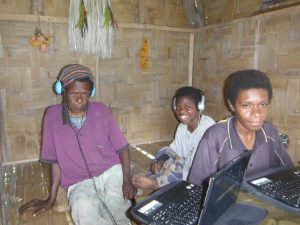
In the photo above, three generations of Nungon women work on the Nungon grammar project.
Ealeal Semel (’07) – A Play Titled “Murder” – The play “Murder” is a political theatrical production dealing with the Israeli-Palestinian conflict, starring Israeli and Palestinian students from all facets of Israeli society.
Lior Soroka(’99) – After His Death (short film). “After His Death” is a ten-minute film independently produced and directed about a girl who, during her father’s shiva, discovers he had an affair with another man.
Auren Weinberg (’87) – Second Helping Schools Project. Second Helping Schools Project teaches children about food insecurity, compassion, and eliminates stigma.
Jonah Fisher (’06) – FLO Community Co-Working Space. Intentionally designed to build relationships, FLO is a community workspace in Tel Aviv all about connecting professionals to better their surroundings.
Julie Geller (’91) – Setting the Stage. Love Julie Geller’s music and message? Join a network of women who are uplifting and helping one another personally and professionally.
Ben Wolfson (’11) – Pockets Against The Patriarchy. PATP brings utility and comfort to women’s clothing. We add pockets to business suits, fighting the fashion industry’s sexism.
Project name: The Hitchhikers
The documentary series, “The Hitchhikers,” documents the spontaneity and richness of hitchhiking (and offering rides) in Israel.

Project name: Nahara Dance Group
Nahara is an Israeli dance company for religious women with a professional, honest and personal approach that remains respectful of the religious observances of its members and audience.
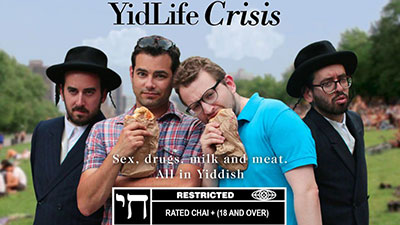
Project Name: YidLife Crisis – European Outreach Tour
Yidlife Crisis, a Yiddish language web-series with a modern twist, is engaging with European Jewish audiences through both live presentation and filmed docu-travelogue videos.
Project Name: 2States1Homeland-Jerusalem Activists
2States1Homeland is a new Israeli-Palestinian initiative that aims to change the discourse around the two states/one state paradigm and offers a different approach: a confederacy of two sovereign states with open borders and joint institutions.
Project Name: Minyan Yedid Nefesh
Minyan Yedid Nefesh, based in Newton, MA, is a partnership minyan, which is constantly experimenting to fit the needs of its expanding community.
Project Name: Leon Roth Foundation
The Leon Roth Foundation seeks to encourage a new generation to engage with Roth’s seminal works, to use his ideas to invigorate current discourse, and to bring Roth into dialogue with other philosophical voices. A 2-day conference on Roth will be held at the University of Toronto Centre for Jewish Studies with speakers addressing topics spanning Roth’s interests, including Jewish philosophy including ethics, Jewish education, and Judaism and democracy.
Project Name: Sewn Scroll
Sewn Scroll is a Jewish fashion exhibition showcasing 7-8 original, hand sewn outfits, each exemplifying a differing stance on Jewish life and practice.
Project Name: Alliance of Jewish Progressives
Based at Princeton University, Alliance of Jewish Progressives unites Jewish students from across the religious and cultural spectrum to discuss progressive politics, social justice issues, and Jewish texts.
Project Name: Art Exhibition Booklet
This booklet will accompany the original artwork showcased in Meyer’s upcoming exhibition. It will serve as a guidebook in the gallery, but can also stand alone as a manifesto illustrating the artist’s deep conversation with Judaism in his work.
Project Name: Hyde Park Teen Beit Midrash
The Hyde Park Teen Beit Midrash is a new Jewish learning program that will use chevruta learning to create a new community for middle school and high school students in Chicago. The program aims to develop Jewish text literacy, nurture a mature attitude to learning, and motivate excitement about Judaism through the creative energy of Torah study.
Project Name: Global Migrant Connections: Women at Work
Originally displayed at the Cape Town Holocaust Centre, the photo exhibition, “Women at Work” will now be featured in Flagstaff, AZ. The exhibit beautifully captures the work lives of South African immigrant and refugee women, and is accompanied by text from interviews with the subjects of the photographs.
Project Name: BRYTE Multicultural Library and Learning Center
This project will revamp BRYTE’s existing library to provide books with characters that match students’ identities and abilities therefore enabling BRYTE tutors to have higher quality and more creative tutoring sessions.
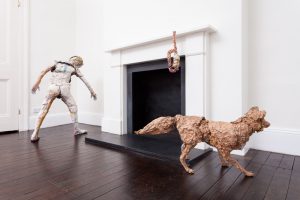
Project name: Metal Beast
Paz’s sculpture series, Metal Beast, is an installation of fantastic, grotesque and delicate animal sculptures made of painted aluminium foil. The sculptural images are inspired by biblical, Talmudic and other visions and fables to create a dramatic scene which the viewers see from ‘behind the scenes’.
Project name: Israeli Novy God
Novy God is a Russian secular New Year’s festival introduced to Israel by Russian-speaking immigrants. This year’s celebration had an Israeli twist and was attended by hundreds (FSU immigrants and natives alike.)
Project Name: JWA Podcast
The Jewish Women’s Archive podcast will bring together a diverse range of contemporary voices to discuss the meaning of Jewish life today, rooted in history, text, and contemporary cultural concerns.
Project Name: Yeshivat Kol Isha
Yeshivat Kol Isha is a post-denominational women’s yeshiva in Jerusalem. The Yeshiva integrates textual learning, spiritual practice and creative expression, celebrates feminist spirituality, and promotes women’s leadership.
Project name: Heart in the East
Heart in the East is a student-led group at Hebrew University for members to discuss the many facets of Mizrachi (Middle Eastern Jewish) identity.
Project name: Community Batei Midrash
The Beit Midrash for Torah and Life makes Torah study accessible to all and allows students to build relationships within their respective communities.
Project Name: Jewish Parents Academy
The Jewish Parents Academy is a local Jewish learning center for Russian Jews. It offers parents and families high caliber, engaging, non-denominational Jewish learning and events.
Project Name: Women’s Scholarship Amplified
Yeshivat Maharat seeks to amplify women’s voices in Orthodox religious scholarship by supporting, printing and publicizing the written works of one of the school’s graduates, Rabba Dr. Anat Sharbat.
Project Name: YentaNet
YentaNet is paving the way in contemporary, pluralistic, individual-oriented Jewish match-making. YentaNet works confidentially, compassionately, diligently, and professionally with single Jews of all backgrounds, who are seeking meaningful, monogamous relationships with other self-identifying Jews.
Project Name: Midtown Workmen’s Circle School Social Justice Events The Workmen’s Circle is organizing two public, social justice-themed family programs: the 2016 Martin Luther King Day of Learning, Service and Action; and the youth-led, youth-built Purim carnival created with Jews for Racial and Economic Justice.
Arts + Culture
Ari Allen (’11) – Washington University Jewish Film Festival
The Wash U Jewish Film Festival (WUJFF) is a weekend of themed films that address different aspects of Jewish or Israeli life relevant to college aged students.
Eli Batalion (’97) – Yidlife Crisis

YidLife Crisis is a video series hosted at YidLifeCrisis.com and syndicated across the web which aims to address the modern Ashkenazi YidLife Crisis: what is your identity when you’re brought up with elements of “old country” Yiddishkeit, but are trying to carve out a modern 21st century identity in a secular world naive to the shtetl life? YidLife Crisis explores how to reconcile this dichotomy by following the lives of two bokher bachelors, Leizer and Chaimie (Eli Batalion and writer/actor Jamie Elman’s Yiddish doppelgangers), hipster 30-something Montreal Jews trying to hustle “careers,” pick up women and enjoy all that Montreal’s bohemian Mile End district has to offer except… they only speak Yiddish. They talk in Yiddish, text in Yiddish, sing in Yiddish, blending seamlessly into a Montreal linguistic backdrop of French and English.
Ellie Gettinger (’98) – JMM “After Hours”
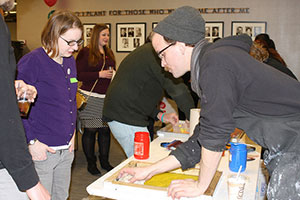
Jewish museums can fill a void in providing a meeting place for young Jews and offer cultural and historic connections. With the help of the Alumni Venture Fund, we created a buzzworthy, topical, engaging event about three upcoming exhibits, “Andy Warhol: Ten Portraits of Jews the Twentieth Century,” “Jews Who Rock: A Musical History Tour,” and “Stitching History after the Holocaust: The Life of Hedvika Strnad.” During these events, we have local artists and dynamic speakers showcasing their talents.
Binny Kagedan (’02) – Still Small Sounds
A songwriter by hobby, I I draw inspiration from the narratives and idioms of the Jewish bible. With the hope that the fruits of these explorations may resonate with my fellow Jews and others who, from time to time, or all too often, feel estranged from the possibility of spiritual connectedness, I am collecting these songs into a professionally produced album to be made available to the Jewish community and beyond.
Andy Neiman (’90) – ACCORDING TO JOE Chicago Workshop
I am the co-writer and key researcher for a historical comic drama explored through the perspective of Joseph of Nazareth, the father of Jesus Christ and husband of the virgin Mary.
Noa Silver (’04) – Dinner and a Play Reading
A year and a half ago I spent several hours interviewing my father about his life story. I grew up hearing fragments of stories about being raised in Brooklyn in the 1950s by his Russian grandmother, about getting swept up in the anti-war revolutionary movement of the 1960s and 70s after he was, essentially orphaned, and finally the moments of great triumph and realization that came when he decided to pursue a career as a classical musician. My hope is to put on a staged reading of the play based on his experiences for my community here in Berkeley
Lior Zalmonson (’00) – Print Screen Conference
Social Responsibility:
Shira Engel (’09) – cOMmunity Yoga School
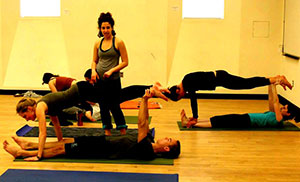
This project will create the first-ever donation-based yoga teacher training for populations that cannot otherwise afford to become certified yoga teachers. These populations include recent college graduates, current students, low income/unemployed adults, recently incarcerated adults, and people of all socio-economic classes and backgrounds. My project offers a 200-hour donation-based service-oriented adult yoga teacher training to people who demonstrate a clear commitment to teaching yoga outside the bounds of the traditional yoga studio. The teachers that we train will use what they learn in the training to engage with their communities directly. This training is intended for people who want to provide yoga to populations which might otherwise not receive it. These communities include homeless youth, school-aged children, students in the classroom, incarcerated youth and adults, low-income populations, and people of differing physical and mental abilities.
Irit Feingold (’06) – Ethiopian Journeys
Yulia Forshik ’06 – The Other
Jaime Korman ’13 – Home 2 Home
I have developed a curriculum called Home 2 Home that uses art to explore the meaning of home for children from immigrant families. My plan is to facilitate a weekly after school art program with children from immigrant Latin American families at a local Boys and Girls Club in San Jose, California. As a Jew, my empathy for the immigrant child’s experience of uprooting and re-rooting is the foundation for this project. I also realize that in an adult-centric world, children rarely get asked for their opinions and feelings about their present lives and it is even less common for immigrant children to be asked to share thoughts and emotions about their experience as migrants. Art offers an ideal way for children to formulate and express their personal perspectives.
Kassandra Loewen (’10) – Huron’s Born This Way Campaign
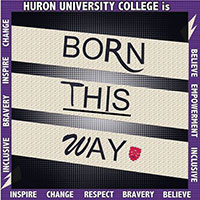
Huron’s Born This Way Campaign (BTW) is a respect, empowerment and anti-bullying initiative. It was launched in the fall of 2012 and is loosely modeled after Lady Gaga’s Born This Way Foundation (www.bornthiswayfoundation.org). BTW was created by Residence Life Staff at Huron University College to ensure our school is a place where people can live and learn without fear of being discriminated against or made to feel isolated because of who they are.
Jess Radin (’93) – Beginning and Belonging: Transnational Adoption in the Jewish Community
As an educator, a writer, and as a Jewish transnational adoptee myself, I am interested in the following questions: How does the experience of transracial adoptees in the Jewish community today differ from when I was in high school, two decades ago? How could Jewish communities better include transnational adoptees? I plan to create a cohort of high school aged adoptees to explore these questions.
Ariela Rothstein (’05) – Encuentros Community School
Encuentros is a political education series conducted as community events consisting of conversations and workshops designed to deepen the knowledge and importance of organizing, leadership, advocacy, cultural awareness & grassroots visions of well being through the introductory study of politics and social movement history in New York City and beyond. An opportunity to learn and build solidarity among diverse immigrant experiences, this workshop will dedicate time to exploring the role of arts and culture in activism while applying innovative learning/teaching techniques that will center participant’s experience in personal reflection and transformation aimed toward engagement and action in their community. The workshops will create an environment of trust and draw from the experience of belonging to a community to produce knowledge together and create collective visions for the future.
Jewish Learning:
Yair Agmon (’04) – Chumash Mekushkash
Hannah Kapnik Ashar (’04) – Come & Listen: Jewish Food for Thought
Come & Listen is a podcast that transmits progressive Jewish responses to timeless questions in a beautifully crafted audio form. We provide listeners the opportunity to connect over ideas, history, personal narratives, and philosophies that perpetuate and innovate the conversation about our Jewish intellectual heritage, and support developing Jewish identities.
Joshua Foer (’99) – Sefaria
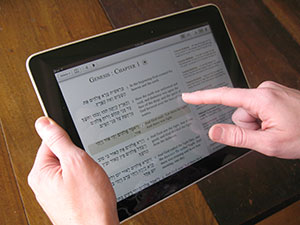
The Sefaria Project will revolutionize the experience of Jewish learning and enhance Jewish literacy and engagement by building a free and universally accessible living library of all Jewish sacred texts. What is a living library? A library that evolves, grows, and interacts with its users, creating a space for conversation among a community of people who thrive on learning and sharing. Sefaria’s website will host this library of Jewish texts and their interconnections, in Hebrew and in translation. Sefaria’s scope is Torah in the broadest sense, from Tanakh to Talmud to Zohar to modern texts and all the volumes of commentary in between. Judaism’s core texts grew out of millennia-long conversations and arguments across generations. Sefaria will create an open space for ancient conversations to continue in new ways, with new participants, new questions, and new layers of dialogue.
Alixandra Kriegsman (’08) – Between the Lines Documentary
Between The Lines offers a deep-dive into how Jewish Day Schools teach Israel’s controversial narrative, and the students who emerge with quivering loyalty and often, strong cognitive dissonance come college. We explore the scope of content offered on Israel’s history and the Israeli-Palestinian conflict in various Jewish Day schools across the country. We ask: Who structures Jewish day school curricula about Israel? Who decides what content to include and exclude? How do you sufficiently explore the Palestinian narrative in the context of a Jewish Day School, which has an obvious (and understandable) agenda of connecting young Jews to the State? What happens to now-college students who feel they were miseducated, undereducated, or too distracted to care at the time? We focus a critical eye on the responsibilities schools have to their pupils, especially when it comes to educating material that defines and shapes not only intellectual but religious identity – when it comes to teaching about a country that intrigues not only our insular community, but the world at large.
Maya Rosen (’11) – Netzitzot
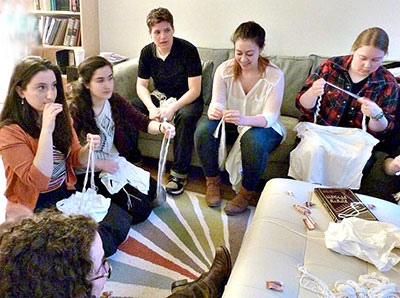
I created an online store for women’s tzitzit (tallit katan), altering store-bought women’s undershirts by cutting and hemming the sides and then tying the tzitzit. To my knowledge, there currently is nowhere to buy women’s tzitzit, on the Internet or elsewhere. I have been creating our own tzitzit for several years, and I know of several other women who do the same. However, we recognize that it is unreasonable to expect everyone to both know how to sew and how to tie tzitzit. I created an easy-to-use website for the product, and though it will start with one relatively simple model, I would like to expand into other fabrics, colors, styles, etc. depending on interest. The tzitzit will be as low-price as possible, potentially even subsidized if it is feasible to do so, as the goal is to make this mitzvah as egalitarian and accessible as possible.
Uri Sefarai (’01) – Daroma Beit Midrash